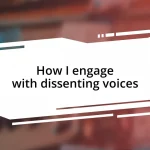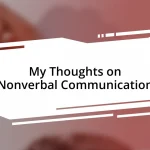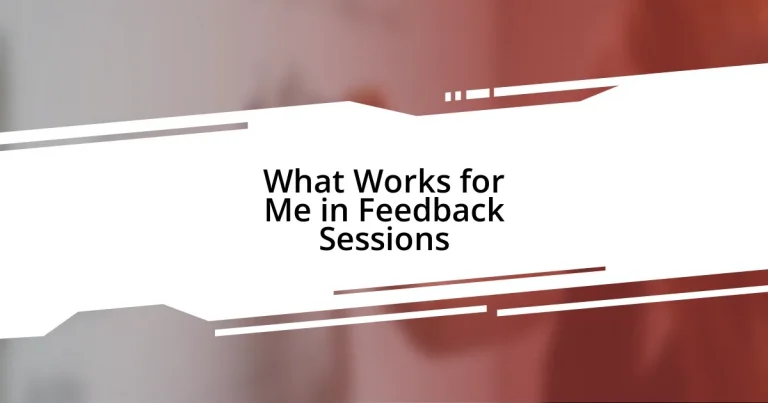Key takeaways:
- Constructive feedback is essential for growth, acting as a compass that fosters self-awareness and motivation.
- Preparation for feedback discussions, including setting the environment and sharing agendas, enhances the quality of conversations.
- Embracing vulnerability and maintaining a growth mindset can transform difficult feedback into valuable learning opportunities.
- Evaluating the outcomes of feedback sessions, through reflection and ongoing dialogue, deepens understanding and improves future interactions.
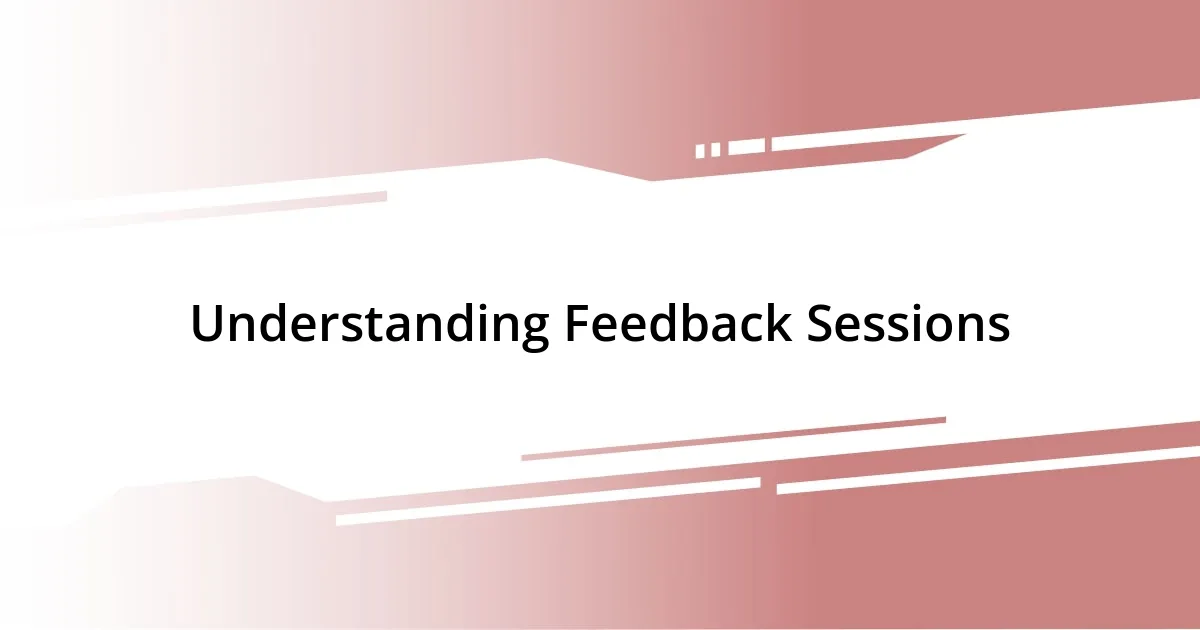
Understanding Feedback Sessions
Understanding feedback sessions can feel a bit daunting at first, but I’ve come to realize they are essential for growth. I remember my early days at work; I would dread those meetings, fearing criticism instead of embracing the opportunity to learn. Why was I so apprehensive? Often, it was simply a misunderstanding of what feedback truly is—a tool for improvement rather than a personal attack.
I’ve learned that the atmosphere in which feedback is delivered greatly influences its reception. One time, during a team retreat, we engaged in an open feedback session that changed my perspective entirely. Colleagues were encouraged to express thoughts in a supportive environment, and I found myself not only appreciating their insights but also feeling a deeper connection with my team. Have you ever experienced a moment like that? When feedback feels collaborative, it becomes a shared journey toward betterment.
It’s vital to remember that feedback is a two-way street. I often find myself asking for clarification after receiving feedback, turning those moments into rich discussions. This approach not only helps me understand the giver’s perspective but also fosters a creative exchange of ideas. Have you considered how your response might shape future conversations? By embracing feedback as a dialogue, we can turn potentially uncomfortable sessions into valuable conversations that ignite our personal and professional growth.
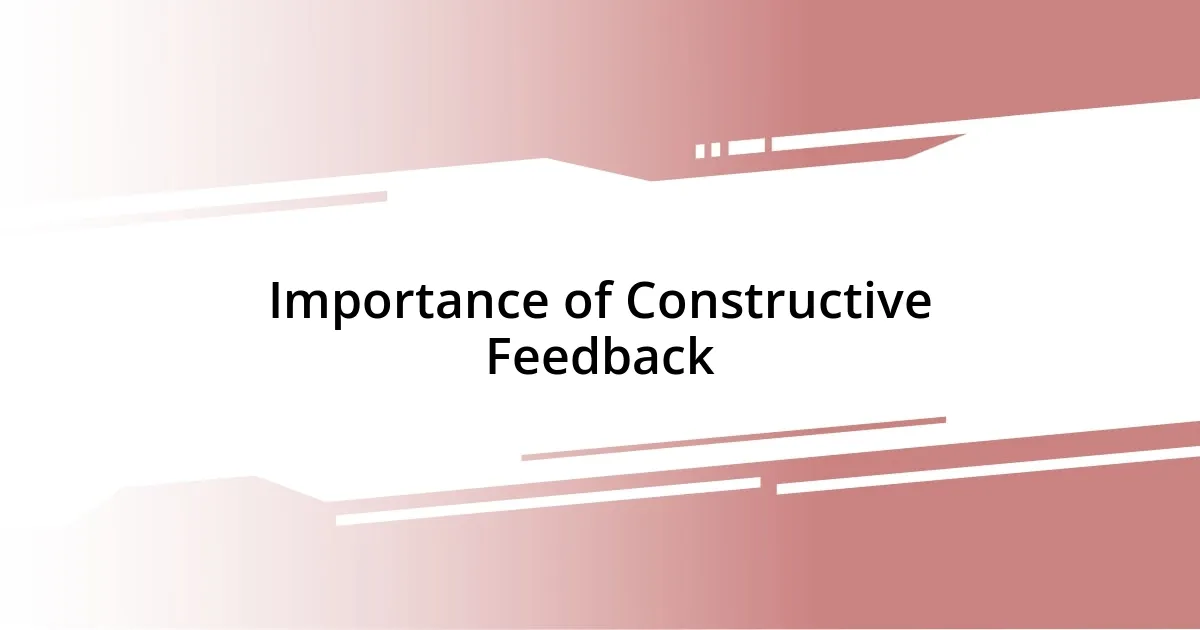
Importance of Constructive Feedback
Constructive feedback is crucial because it acts like a compass for personal and professional development. I once had a mentor who shared a simple yet powerful insight: “Feedback is the bridge between where you are and where you want to be.” This perspective resonated with me deeply, as it reminded me of moments when I felt uncertain about my abilities. Constructive feedback not only provides direction but also instills confidence by highlighting areas for improvement.
Here’s why I believe constructive feedback holds such importance:
- It fosters self-awareness, helping us identify blind spots.
- It encourages growth by presenting an opportunity to learn from our mistakes.
- It builds relationships, creating a culture of trust and collaboration.
- It motivates us to strive for excellence, pushing us outside our comfort zones.
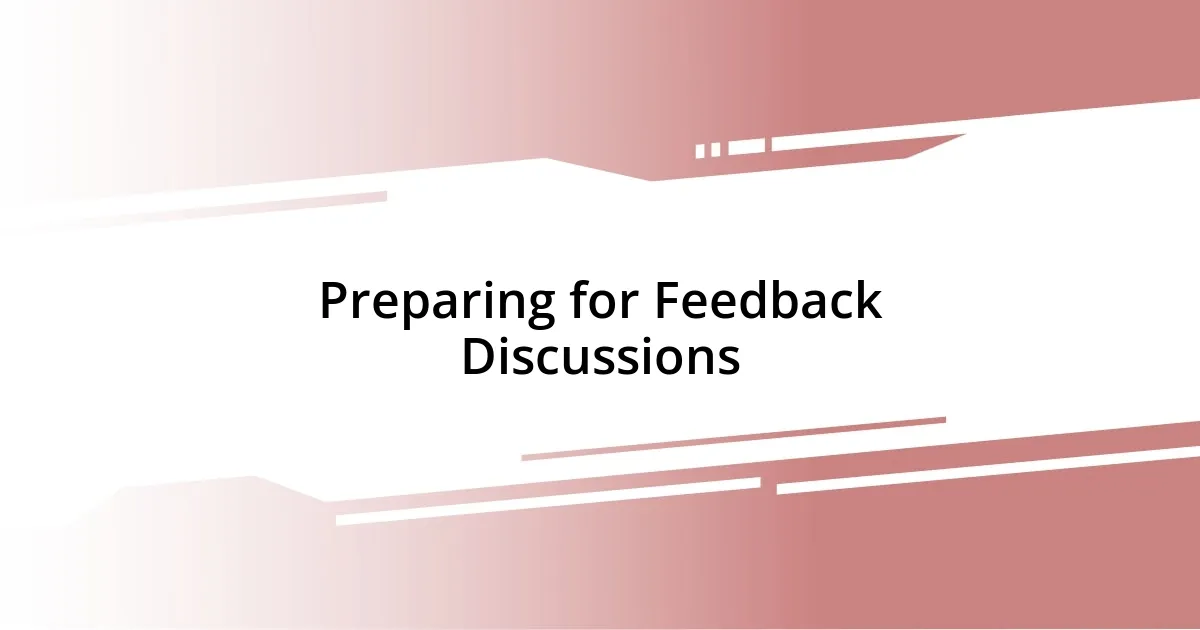
Preparing for Feedback Discussions
Preparing for feedback discussions requires careful thought and intentional planning. I remember one particular project where I had to present my work, and instead of viewing it as a critical evaluation, I approached it as an opportunity to learn. I listed specific areas where I desired feedback, which not only helped guide the conversation but also relieved my anxiety. How do you prepare for your discussions?
I also find it valuable to consider the environment before the session. When I set the stage—whether it’s choosing a quiet space or ensuring we have adequate time—I find people engage more openly. For example, during a recent performance review, I arranged for a relaxed coffee meeting instead of a formal office setting. This small change made it easier for my manager to share insights comfortably, creating an atmosphere conducive to honest dialogue.
One aspect I prioritize is seeking clarification before the meeting. I often send an agenda for what I hope to discuss, which allows everyone to come prepared. I remember feeling overwhelmed when feedback caught me by surprise—taking a proactive approach has transformed those experiences into more structured and valuable discussions. Have you felt the difference when both sides are well-prepared?
| Preparation Technique | Description |
|---|---|
| Identifying Focus Areas | Before the meeting, outline key topics you want feedback on. |
| Setting the Environment | Create a comfortable and open space to encourage honest dialogue. |
| Sharing an Agenda | Provide a list of discussion points beforehand to ensure clarity and focus. |
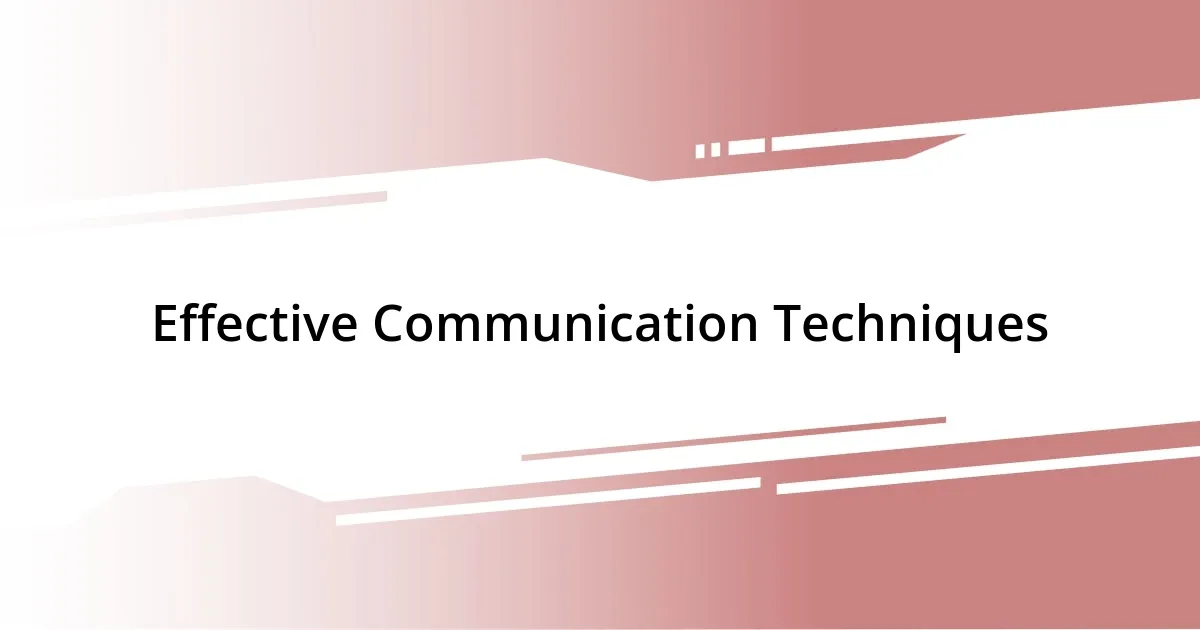
Effective Communication Techniques
Effective communication in feedback sessions often hinges on how we articulate our thoughts. I learned this the hard way during a feedback conversation where I struggled to express my perspective clearly. After that experience, I made it a point to practice ‘I’ statements, such as “I felt overwhelmed by that feedback,” instead of pointing fingers. This shift not only made my feelings clear but also fostered a more constructive discussion. Have you ever noticed how using ‘I’ statements invites a more personal connection?
Another technique I find beneficial is active listening. It’s easy to get caught up in what we want to say next, but tuning into the other person’s words can bring significant insights. I remember a moment when my colleague shared her concerns, and instead of interrupting, I allowed her to finish before I responded. This created a safe space for her to open up more, ultimately leading to a more fruitful exchange. Isn’t it fascinating how shows of attentiveness can encourage vulnerability in others?
Moreover, asking open-ended questions can make a world of difference. Instead of saying, “Do you think that worked?” I began asking things like, “What did you think about that approach?” This tweak transformed how I received feedback. It turned a yes-or-no question into a dialogue, prompting deeper reflections that enriched our conversation. Each time I employ this technique, I’m reminded of how much more there is to discover when we encourage a richer exchange of ideas. What techniques have you found effective in creating an engaging dialogue?
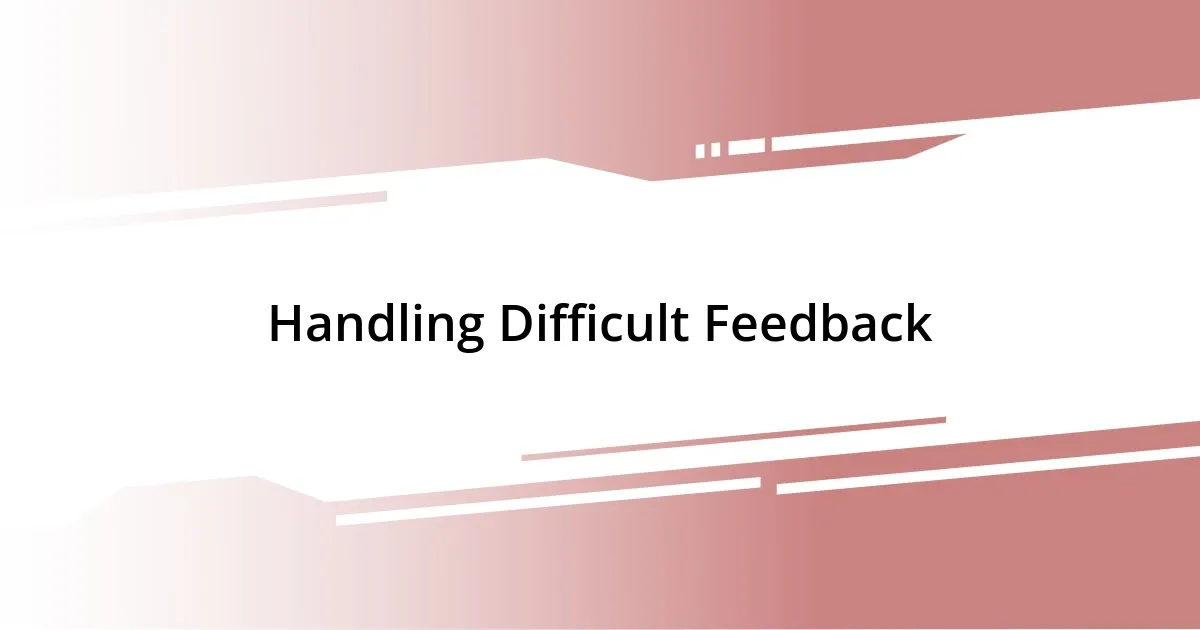
Handling Difficult Feedback
Handling difficult feedback can feel daunting, but I’ve found that embracing vulnerability can be incredibly powerful. I recall a particular instance where the feedback I received hit a nerve. Instead of shutting down, I took a deep breath and acknowledged my feelings in the moment. Saying, “That really stung” opened up a candid conversation about why I felt that way, and surprisingly, it led to a deeper understanding between us. Have you ever noticed how vulnerability can sometimes invite empathy rather than defensiveness?
Another aspect I’ve learned is the importance of reframing the feedback. During a tough session, I struggled to digest a critique that felt overly harsh. What helped me was turning my focus from the emotion of the words to the intention behind them. I asked myself, “What can I extract from this, regardless of how it was delivered?” This mindset shift transformed my frustration into a learning opportunity. Have you tried reframing feedback to uncover its hidden value?
Lastly, maintaining a growth mindset is essential when dealing with difficult feedback. I used to take criticism personally, which could leave me feeling defeated. However, when I began viewing feedback as a stepping stone for improvement, I noticed a change in my response. I remember a time when I received a critical review of my project, and instead of feeling crushed, I approached it as a chance to enhance my skills. This perspective not only reduced my anxiety but also fueled my motivation to grow. How do you cultivate resilience in the face of challenging feedback?
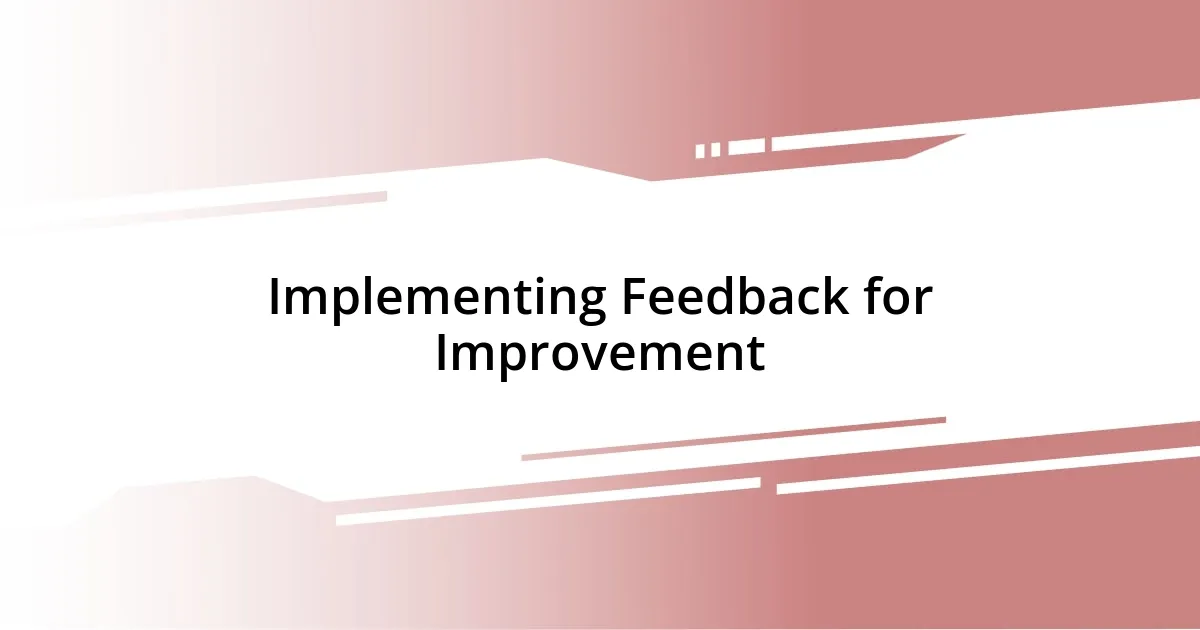
Implementing Feedback for Improvement
Implementing feedback effectively can feel like an art form, but it truly thrives on intention. I vividly recall a time when my manager gave me constructive criticism on a project. Instead of taking it as a setback, I mapped out a plan right then and there, identifying specific actions I could take to implement the feedback. I asked myself, “How can I turn these insights into tangible results?” This proactive approach made a world of difference in my subsequent work.
Another key aspect of applying feedback is to be open about the changes you’re making. I once shared my action items with my team after receiving feedback on our collaboration process. I explained what I intended to improve and encouraged them to hold me accountable. This not only showcased my commitment to growth but also inspired others to engage in their own feedback journeys. Have you ever thought about the power of transparency in a team setting?
Finally, reflection is crucial after implementing feedback. I’ve started keeping a feedback journal, where I document the suggestions I receive and how I apply them. Periodically revisiting these notes allows me to measure my progress and celebrate small victories. It’s gratifying to look back and see how far I’ve come, but it also sparks the question: “What’s the next step in my growth?”
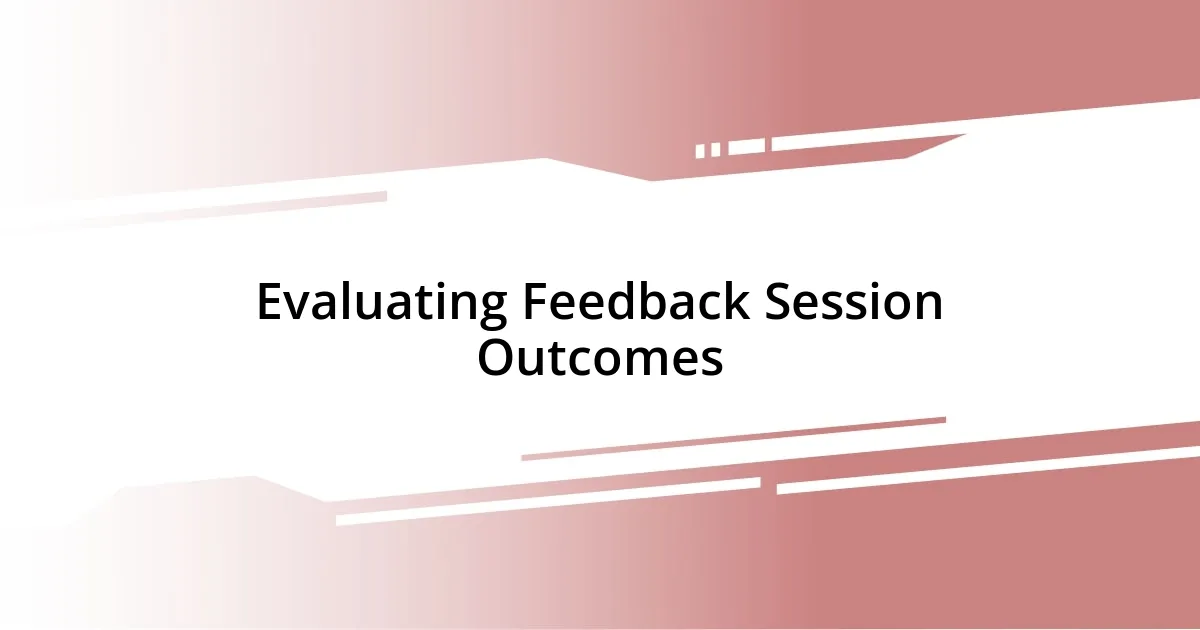
Evaluating Feedback Session Outcomes
Evaluating the outcomes of feedback sessions is a critical step many overlook. I remember a time when I conducted a follow-up to gauge how my team felt about the adjustments we made after receiving feedback. It was enlightening to hear their perspectives—some felt more empowered while others needed further clarification. Isn’t it fascinating how perspectives can vary so widely?
Tracking specific changes resulting from feedback can illuminate its effectiveness. After one particularly constructive feedback session, I developed a simple checklist to see how my adjustments aligned with the original suggestions. Reflecting on these concrete results my choices led to—whether it was improved communication or enhanced project outcomes—allowed me to understand the nuances of feedback application deeply. Have you ever tried measuring the impact of your changes?
Finally, I find that engaging in ongoing dialogue after feedback sessions greatly enhances evaluation. A colleague and I set up informal catch-ups to discuss how we were both implementing feedback over coffee. These chats not only fostered camaraderie but also sparked invaluable discussions about what was working and what needed tweaking. Isn’t it amazing how informal settings can yield profound insights?
